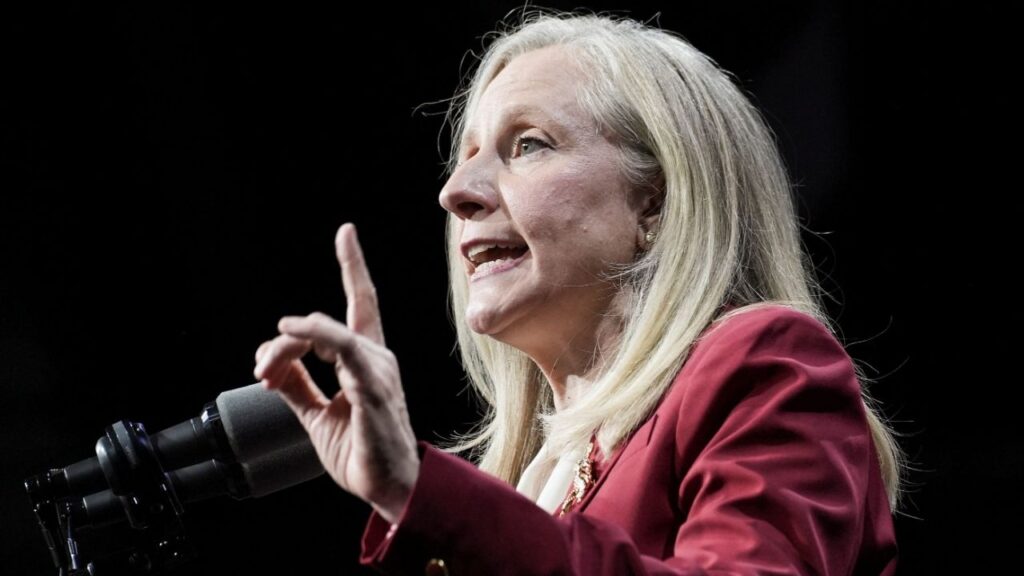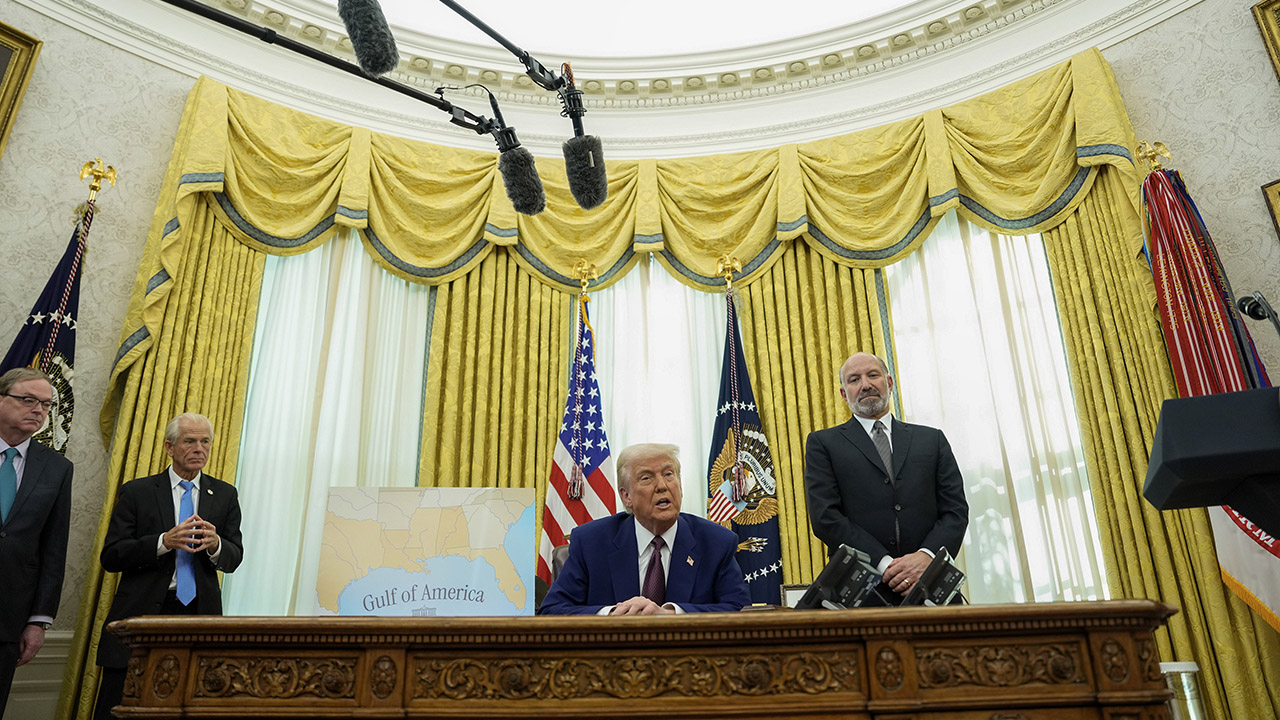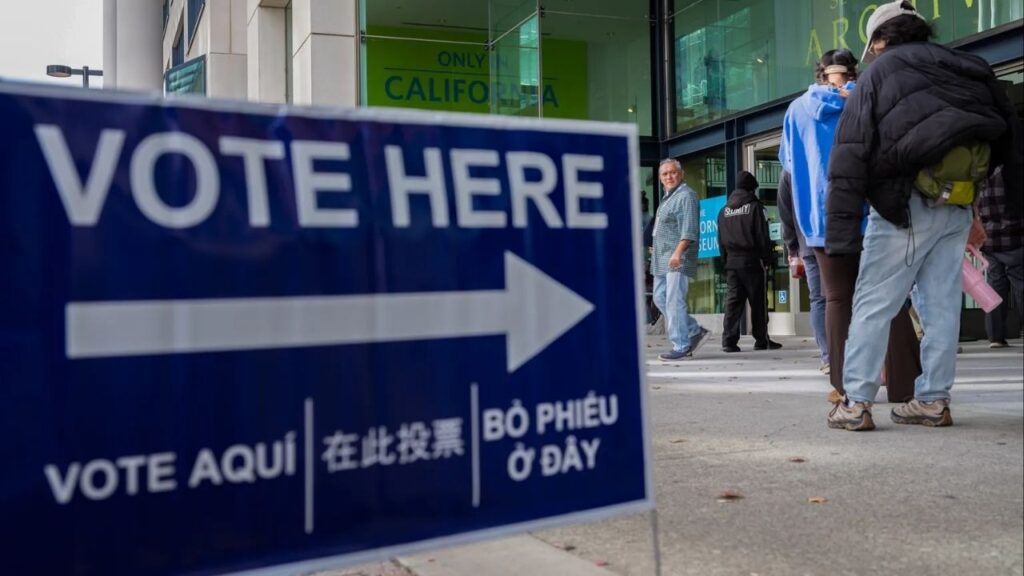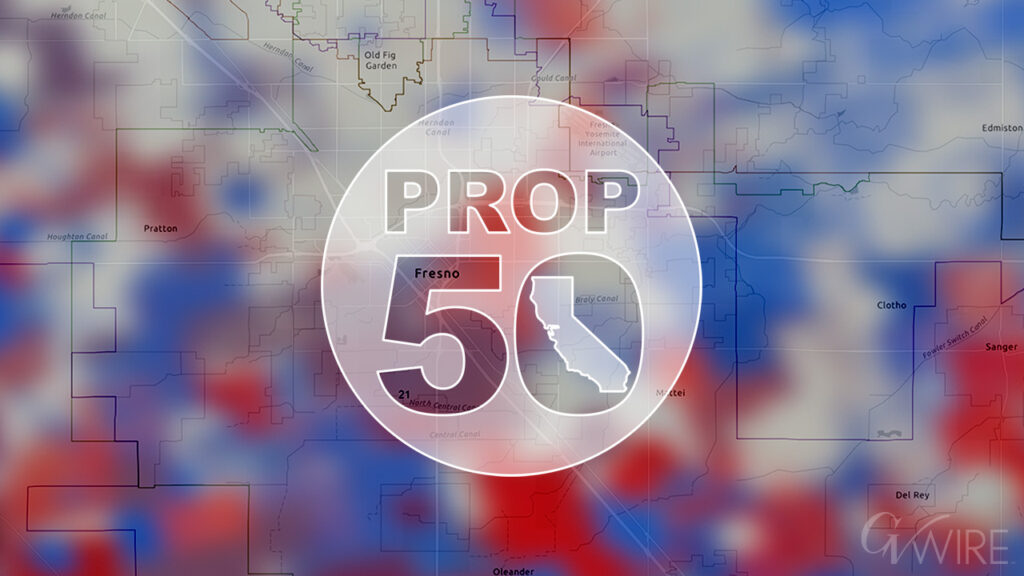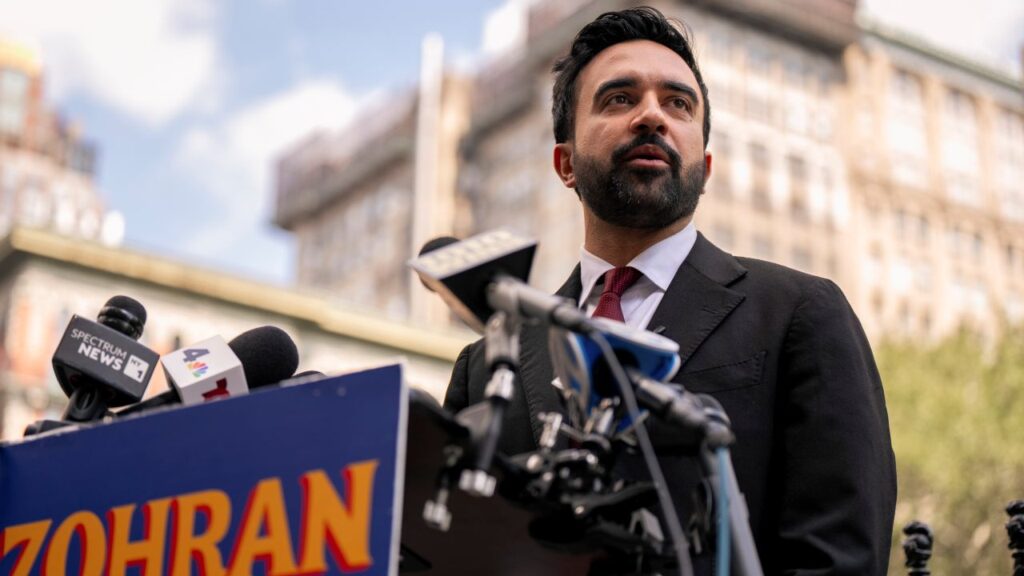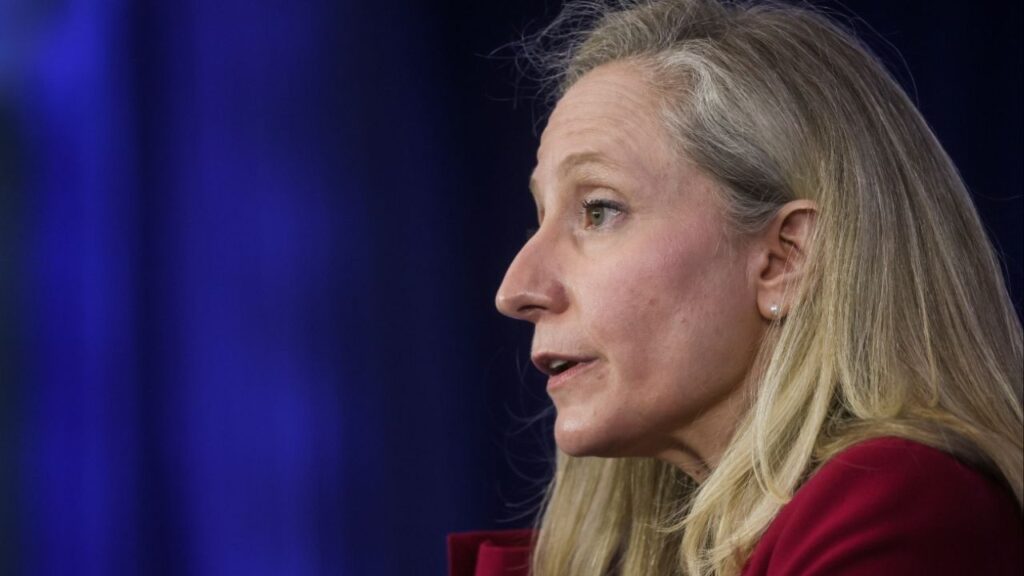President Donald Trump speaks to reporters as he signs executive orders in the Oval Office of the White House in Washington, on Thursday, Feb. 13, 2025. Trump has ordered a radical set of changes to the federal government. Some are within the traditionally understood scope of a president’s power, but many appear to purposely violate statutes, setting up tests of whether limits imposed by Congress on the White House are constitutional. (Eric Lee/The New York Times)

- Trump's actions test limits of presidential power, with many moves facing legal challenges in federal courts.
- Controversial orders span immigration, federal staffing, spending freezes, and LGBTQ+ and diversity policies.
- Legal experts warn of potential constitutional crisis as Trump pushes boundaries of executive authority.
Share
|
Getting your Trinity Audio player ready...
|
(The Upshot)
In his first month in office, President Donald Trump has ordered a radical set of changes to the federal government. Some are within the traditionally understood scope of a president’s power, but many appear to purposely violate statutes, setting up tests of whether limits imposed by Congress on the White House are constitutional.
The bounds of presidential power can be hazy, and the Republican-appointed supermajority on the Supreme Court could expand them. Still, so many of Trump’s actions have defied apparent legal limits that some scholars say the country is approaching a constitutional crisis.
Here are 38 of the Trump administration’s biggest moves so far.
READING THE LIST
~ Actions that appear to conflict with specific statutes or to violate the Constitution.
* Actions that have been temporarily blocked by a judge, either partly or completely.
Actions without these symbols appear more likely to fall within mainstream understandings of presidential power, but may still be unusual or subject to legal challenges.
STAFFING, FIRINGS AND DOGE
~* Accessed sensitive data systems at the Treasury Department. States have sued, arguing that this effort by Elon Musk and an initiative called the Department of Government Efficiency, or DOGE, violates the Administrative Procedure Act, the Privacy Act of 1974 and other statutes. Musk’s team has also sought access to vast amounts of data across the government, including at the IRS and the Social Security Administration, prompting lawsuits. (A federal judge has temporarily restricted Musk’s team and Trump’s political appointees from accessing Treasury Department data.)
~* Moved to dismantle the U.S. Agency for International Development, including by placing thousands of employees on leave. A union of federal workers has sued, arguing that only Congress can dissolve the agency and fold its remnants into the State Department, as Trump is trying to do. (A judge has blocked parts of this.)
~* Fired the head of an office that protects whistleblowers and fired members of the National Labor Relations Board, the Merit Systems Protection Board, the Equal Employment Opportunity Commission, and the Privacy and Civil Liberties Oversight Board. Congress created those agencies to be independent of the White House, and it has been understood that presidents cannot summarily fire their leaders before their terms are up without a cause like misconduct. That limit is explicit in some of their statutes. Several fired officials have sued, setting up potential Supreme Court tests of those limits. (Judges have ordered some of those officials reinstated for now.)
~ Enabled agency heads to summarily fire some career federal employees without obeying civil-service protections. Trump’s executive order instantly nullified a regulation by the Biden administration to impede such firings, but the order may have violated the Administrative Procedure Act. (That’s a law that governs the executive branch’s rulemaking authorities.) A union representing federal employees has sued.
~ Offered buyouts to federal workers. The offer said workers would be placed on administrative leave and paid through the end of September, but it may conflict with laws about leave and severance payments for federal workers. Congress also hasn’t appropriated money for buyouts. (A judge paused the program, but then lifted the pause, for technical reasons.)
~ Ordered Consumer Financial Protection Bureau staff members to stop most work. Congress created the agency, so it would take congressional action to close it. A union representing federal employees has sued, saying that staff members now can’t fulfill the agency’s mission as written into law.
~ Fired as many as 18 inspectors general. A law requires giving Congress 30 days’ notice and detailed, case-specific reasons in writing for any removal of an inspector general, but Trump ignored it. Several of them have filed a lawsuit, saying the firings “violated unambiguous federal statutes.”
~ Fired more than two dozen Justice Department prosecutors. There are laws aimed at protecting the civil service and its senior career officials, and they require certain processes.
~ Empowered Elon Musk to overhaul the executive branch. Several lawsuits have been filed arguing that Musk and DOGE lack legitimate legal authority to undertake the sweeping effort to downsize and dismantle federal agencies.
Established DOGE. In general, establishing a new unit is within Trump’s power. Previous presidents have regularly created new units within the executive office of the president. DOGE is not a Cabinet-level department; it was technically a renaming and repurposing of the United States Digital Service, which was itself created by President Barack Obama.
Ordered the FBI to turn over a list of everyone who worked on Jan. 6 cases. Agents have sued, saying they believe the administration intends to reveal their identities, which could put them and their families in danger. (A judge has temporarily blocked the public release of names.)
Froze federal hiring. Previous administrations have frozen hiring.
Ordered security clearances for some people without typical vetting and stripped them from others. The president has authority to issue and revoke security clearances.
Fired the director of the Consumer Financial Protection Bureau, the head of the Transportation Security Administration and the commandant of the Coast Guard. Congress created these positions to serve fixed terms that would not necessarily turn over at the moment a new president takes office. But the president nevertheless has authority to remove people in such jobs.
Dismissed thousands of probationary workers across the federal workforce. Probationary workers — often but not always in the first year of their jobs — don’t have the full protections that other civil service workers do.
SPENDING
~* Instituted blanket spending freezes. The administration has, at various points, paused funding across vast parts of the government, including:
— A broad array of federal grants and loans, covering virtually every program that distributes money.
— Funding from the bipartisan infrastructure law of 2021 and the Inflation Reduction Act of 2022.
— Most U.S. foreign aid.
Under the Constitution, Congress controls the power of the purse. The executive branch has some authority to temporarily freeze the expenditure of funds appropriated by Congress, but a law called the Impoundment Control Act of 1974 — which Trump has said he wants the Supreme Court to strike down — says that any permanent decision to hold back particular spending requires the president to obtain congressional permission.
Judges have issued temporary restraining orders blocking Trump’s blanket freezes on foreign assistance and a since-rescinded directive to freeze as much as $3 trillion in domestic spending, citing Congress’ constitutional power over spending and the Administrative Procedure Act. But many grant and contract recipients have said the money remains inaccessible.
FOREIGN AFFAIRS
~ Allowed TikTok to keep operating in the U.S. by ordering the Justice Department not to enforce a ban. Congress had passed a law barring TikTok from operating in the United States unless its Chinese owner sold it.
~ Ordered withdrawal from the World Health Organization. It’s not clear whether Trump can unilaterally cut this membership because it was enshrined by a congressional joint resolution and therefore may have to be dissolved in the same way.
Ordered withdrawal from the Paris climate accords. Trump also did this in his first term. (It’s just not clear he can do it “immediately,” as his order says, because the agreement stipulates that withdrawing takes a year.)
Placed tariffs on Chinese goods. In past decades, Congress has given the president authority to impose tariffs for various reasons, including national security.
Imposed sanctions on the International Criminal Court, accusing it of targeting the U.S. and Israel.Penalties could include barring ICC officials from entering the United States. The president has broad power to impose such sanctions, based largely on a law Congress passed in the 1970s.
Related Story: Trump’s Forest Service Cuts Raise Wildfire Concerns in Western US
IMMIGRATION AND BORDER POLICY
~* Moved to end birthright citizenship for the children of immigrants in the country illegally. The language of the 14th Amendment guarantees citizenship to nearly everyone born in the United States. The Trump administration has argued that one clause in the amendment should be reinterpreted as excluding babies born to temporary visitors and immigrants in the country illegally. (Blocked by several judges.)
~ Sent migrants to Guantánamo Bay. Moving migrants in immigration detention awaiting deportation to an offshore prison camp raises novel legal questions. People on U.S. soil have constitutional rights to counsel and due process, even if they are in the country without documentation, and it’s not clear whether the government can end that right by involuntarily moving them abroad. Legal groups have sued to gain access to the men.
~ Halted asylum. Under the new policy, the administration has shut down the southern border to asylum-seekers. But there are national and international laws on asylum. Some of the president’s efforts to restrict asylum in his first term were struck down by the courts. Advocates for immigrants have sued.
~ Threatened to take funds from cities that don’t cooperate with federal immigration enforcement. This revives an unsettled legal fight from the first Trump term. The threat raises legal issues under the Impoundment Control Act. There are also Supreme Court precedents that restrict the federal government from imposing conditions on grants that are unrelated to the purpose of those grants or otherwise commandeering state governments to perform a federal government task. San Francisco and other cities have sued.
~ Sought to restart his “Remain in Mexico” policy. This action forced some migrants to wait in sometimes dangerous or unsanitary conditions in Mexico while a U.S. judge decided their case. It faced challenges throughout the first Trump administration, but those didn’t wrap up. If advocacy groups file another challenge, it’s likely to end up at the Supreme Court.
~ Invoked emergency power to spend more on a border wall than Congress has authorized. Declaring an emergency unlocks a power to repurpose funds that lawmakers said should be spent on something else. A statute enacted by Congress gives presidents wide latitude to decide for themselves whether an emergency exists. Still, Trump’s similar move in his first term led to legal challenges, which were not definitively resolved before he left office. That means the revived version could end up in court, too.
Restarted the death penalty, including for cases in which an immigrant in the country illegally is charged with murder. The U.S. attorney general has broad authority to seek the death penalty in individual cases.
Suspended refugee resettlement. Presidents have the power to determine the number of refugees allowed into the country, though they are supposed to do so in consultation with Congress.
Related Story: Trump Expands Immigration Enforcement Across Nearly Every Major Department
OTHER DOMESTIC POLICY, INCLUDING ENERGY, DEI AND LGBTQ+ ISSUES
~* Ordered transgender women who are federal prisoners into men’s housing. Plaintiffs in lawsuits against this effort said it would violate prisoners’ rights, under the Eighth Amendment, to be kept safe while incarcerated. (Blocked by a judge for several women.)
~* Threatened to take funds from hospitals that offer gender transition treatment for people under 19. After Trump put out the order, some major hospitals announced they would pause such care. Lawsuits argue that the order discriminates against young transgender people, unlawfully withholds funds appropriated by Congress and violates the right of states to regulate the practice of medicine. (Blocked by two judges.)
~* Removed thousands of government web pages to scrub references to diversity and “gender ideology.” A doctors’ advocacy group has sued, saying the action violates the Paperwork Reduction Act of 1995 and the Administrative Procedure Act. (A judge has ordered the Centers for Disease Control and Prevention to temporarily restore pages taken down.)
~ Ordered passports to reflect individuals’ sex at birth, not their gender identity. A lawsuit from the American Civil Liberties Union says this violates the constitutional rights of transgender and nonbinary people — including to equal protection, travel, privacy and speech — and violates the Administrative Procedure Act.
Pardoned Jan. 6 rioters, including those who assaulted police officers. The Constitution gives the president unfettered power to grant clemency for federal crimes.
Prevented some new Biden-era federal rules from taking effect. It’s relatively common in recent history for new administrations to issue a moratorium on new rules not yet published.
Related Story: Musk Waves Chainsaw and Charms Conservatives Talking Trump’s Cost-Cutting
Renamed the Gulf of Mexico (to the Gulf of America) and Denali (to Mount McKinley). The administration has the power to change names on U.S. maps, though other countries don’t have to follow suit.
Ordered a 60-day pause on approvals for all “renewable energy development” on public lands. The freeze is similar to a step that the Biden administration took in early 2021, though that paused approval of new coal, oil or gas projects on public lands.
Ordered the Treasury to stop minting pennies. The Treasury appears to have the power to decide how many of each denomination of coin to mint, according to a statute in the U.S. Code. (Although Congress generally has authority over the manufacture of the nation’s coins, according to the U.S. Mint.)
—
This article originally appeared in The New York Times.
By Francesca Paris and Charlie Savage/Eric Lee
c.2025 The New York Times Company
RELATED TOPICS:
Categories
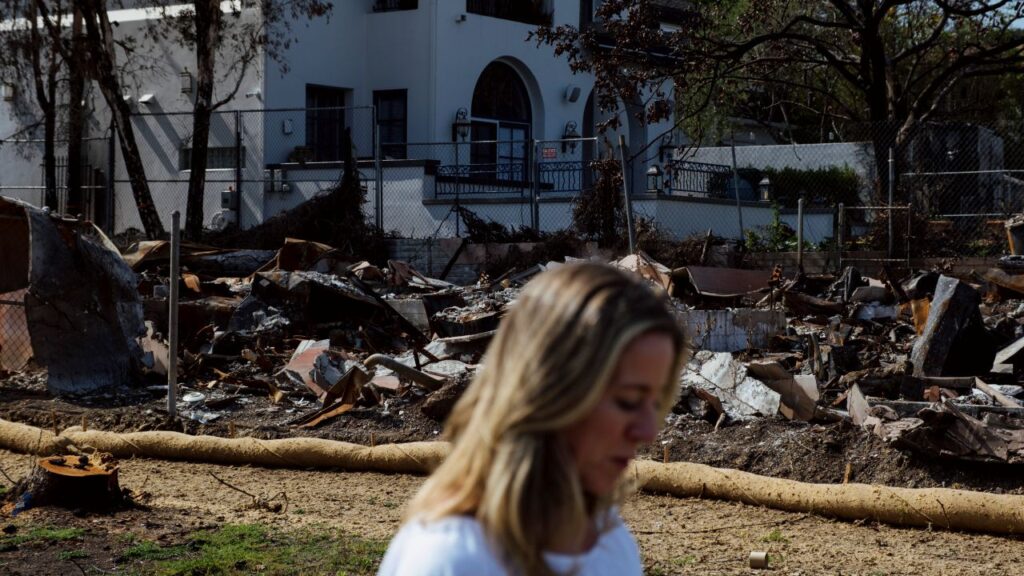
California Promised Insurance Relief But Delivered Loopholes
